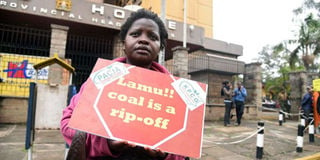Why coal mining will compromise Kenya's critical development agenda

A woman takes part in a Greenpeace and environmental activists' demonstration in Nairobi against the construction of a coal plant in Lamu, June 12, 2019.
On June 10, 2008, president Mwai Kibaki officially launched Vision 2030 to transform Kenya into an industrialised middle-income country in a clean and secure environment.
In 2018, President Kenyatta decided to concentrate on some of the economic deliverables of the Vision 2030 by coming up with the Big 4 Agenda; which are universal healthcare, manufacturing, affordable housing, and food security.
In the 2021/2022 budget before Parliament, the Big 4 agenda was allocated Sh142 billion. This is a clear indication that President Kenyatta is committed to it.
And coal proponents feel they can play a part in the Big 4 Agenda. They have argued that a coal industry will help the country get cheap electricity to support industrialisation and manufacturing. Nothing could be further from the truth. In this piece, I attempt a quick breakdown of how a coal industry would only undermine the Big 4 agenda.
Universal Healthcare
If we take universal healthcare to mean every Kenyan is covered by up-scaling National Hospital Insurance Fund uptake, then this noble idea is negated by the fact that a coal industry will significantly compromise this uptake and the overall effectiveness in the country.
Coal is responsible for over 800,000 premature deaths globally, with countries like China accountable for about 670,000 annually, India 80,000-115,000 annually, US 13,000 annually and 23,000 annually in Europe. Not to mention that these countries have way better health systems than Kenya.
Never mind that our government institutions like the National Environment Management Authority are understaffed and have time and again failed to ensure plants, like the small Owino Uhuru lead factory, which negatively impacted many residents in Mombasa, are run safely.
Investing in coal will undermine any gains that can come out of universal healthcare because of the disease burden.
Manufacturing
The plan is for manufacturing to contribute 15 per cent to the GDP (currently contributes about 8.5 per cent). Automatically this will generate employment opportunities for unemployed youths through the myriad industries like cement manufacturing and steel industries.
However, experts looking at the proposed Lamu coal plant have cautioned that the plant will be severely underutilised and end up charging anywhere between 22 to 75 shillings per kilowatt-hour.
This will cause the electricity tariffs to skyrocket and make production/manufacturing costs higher, making our products non-competitive locally and internationally. Therefore, it will demotivate industries and manufacturing companies from setting up in Kenya and move to other countries with cheaper electricity tariffs.
As explained in this article, what is really affecting the manufacturing sector is high electricity tariffs and poor transmission and distribution network, causing an unreliable electricity supply.
Affordable housing
The aim is to construct 500,000 new affordable homes for Kenyans in the 47 counties. This plan is seriously threatened. Coal will result in higher electricity tariffs. The higher electricity tariffs to manufacturers (as explained above) will result in construction items like cement and steel becoming expensive, which will increase the construction costs for the houses.
This will, in turn, make the houses unaffordable to most, if not all, of the 500,000 intended occupants.
Food security
The government intends to make food cheap and available for all Kenyans with its plans to do so by supporting farming, livestock keeping and fish production. This includes initiatives like providing fertiliser subsidies and thinking around livestock insurance and food security model farms.
Food security is threatened by climate change that stands to be exacerbated by the coal plant’s emissions. Kenya has committed to cut its carbon emissions by 32 per cent by 2030, the coal plant at Lamu will single-handedly increase our carbon emission by 6-10 per cent. Studies like this show our agriculture’s over-reliance on rain; climate change and climate variability will increase food insecurity since food crops respond differently to any climate variables.
President Kenyatta’s Big Four Agenda therefore stands a big chance if the president focuses on 100 per cent transition to renewable energy.




